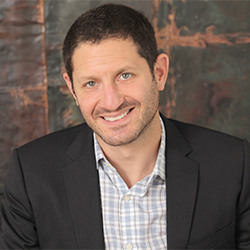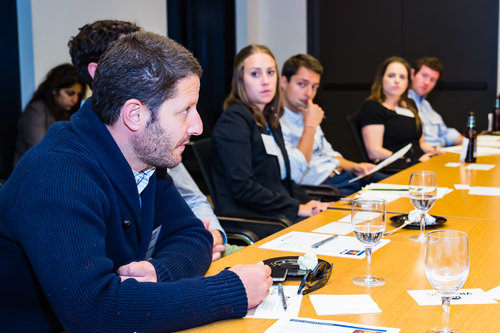Meet the Investor Who's Made a Difference in Vulnerable Communities Across the Globe.
July 31, 2018
Now He's Reenergizing His Efforts in the States
By Mai P. Tran, ECMC Foundation

"We huddle close, and hang on to a dream. On the boats and on the planes, They're coming to America. Never looking back again. They're coming to America!"
Neil Diamond's classic hit "We're Coming to America" played on repeat in the Kerszenbaum household for weeks before the family of four packed their bags for the journey from Israel to their new home, America.
Yigal Kerszenbaum, then only 8 years old, left the only world he had known. He and his family moved into a tiny two-bedroom apartment with his aunts and uncles who arrived several months before. While their place was crowded, and space often was limited, they were hopeful for the better life promised in the states.
In the 1980s, when his family arrived in Los Angeles, they only had five thousand dollars. Initially to make ends meet, Kerszenbaum and his sister helped their mother sell imitation flowers, which they handmade from female stockings and fine wire. Things became better when his father's career took off. Kerszenbaum says his father, a PhD Nuclear Engineer, taught him the value of hard work. The older Kerszenbaum instilled in his son that success comes from "10 percent brains and 90 percent hard work."
Young Kerszenbaum didn't realize it then, but this experience would come to shape his career path. He took his father's advice to heart, applied it to his own education, and now dedicates his work to helping others overcome poverty through hard work, education and job training.
Today, Kerszenbaum, a Georgetown MBA graduate, is the Managing Director of Employment Technology Fund (ETF), an impact investing fund. that invests in technology solutions that train, upskill, inform, and connect low income and lower skilled adults to employment opportunities.
The goal of ETF is to close the employment opportunity gap, which faces millions of Americans who lack the skills, training and opportunities to access family-sustaining jobs. Many of these individuals are from low-income, minority and immigrant communities. The types of investments that ETF makes are program-related investments (PRIs), a set of financial tools that are designed to generate both social impact and financial returns. PRIs make inexpensive capital available to nonprofit or for-profit enterprises that address social and environmental challenges. Unlike grants, financial returns from PRIs are expected and can be recycled into additional investments that further generate positive social impact.
ETF was launched in August 2017 with funding from four leading foundations, including Walmart Foundation, The Rockefeller Foundation, Joyce Foundation and The W.K. Kellogg Foundation. Earlier this year, ECMC Foundation joined as the fifth leading funder.
In his role, Kerszenbaum is responsible for identifying and supporting the growth of innovative tech-based solutions. He says because ETF itself a start-up, his responsibilities run the entire gamut from fundraising, to managing relationships with funders, running day-to-day operations, deal sourcing, and more. Since its launch, it has made five investments including: Cell-Ed, NorthStar, SkillSmart, Nepris and Signal Vine.

Before ETF, Kerszenbaum worked at Developing World Markets and The Rockefeller Foundation. His work in impacting investing through these two organizations took him [literally] around the world from Kenya to Thailand, England, Mexico, Bolivia and 25 other countries. He says his inspiration is drawn from the deep connections he made with local entrepreneurs, from female artisans in Bolivia, to smallholder mango farmers in Africa, shop keepers in India, and immigrant job seekers in the United States.
After working in communities across the globe, Kerszenbaum is excited to reenergize his efforts to closing the employment opportunity gap in the states. The decision came after he recognized that the opportunities he was afforded for economic mobility are slipping away in this country. Citing research from Raj Chetty, Kerszenbaum says, "Individuals born in 1980 had a 90 percent chance of earning more than their parents. For children born today, that number is just 50 percent."
The impact investing expert says he looks forward to making a difference in vulnerable communities in the United States.
Want a career in impact investing? Here are some tips from Yigal Kerszenbaum:
- Do Your Homework: Learn all you can to understand the impact investing landscape within the focus area you are most interested in. There are many good resources out there now that didn't exist when I was looking for a career in impact investing. Do your diligence!
- Network: Build professional relationships. Network with folks, but be respectful of their time. Don't spend all your time working on your resume and cover letter. Seek out informational interviews. Identify the right person to contact, familiarize yourself with the business and contact them appropriately. Teams are interested in personal fit, so getting to know people in the industry is key.
- Heighten Your Hard Skills: Depending on your career choice within impact investing, it is important to have strong financial technical skills, including private equity and venture capital.
- Be Flexible: Being flexible helps. With limited job openings in a competitive field, it's important to be flexible, particularly when trying to get a foot in the door. Be open to opportunities in different locations, geographies, type of institution, etc. The most important thing is getting experience and moving on from there towards your ultimate goal.
About Employment Technology Fund: The Employment Technology Fund (ETF) is an ECMC Foundation grantee in the Education Innovation Ventures portfolio. In January 2018, the Foundation made a $1,000,000 investment in ETF. ECMC Foundation joins the Joyce, W.K Kellogg, Rockefeller and Walmart Foundations as an Executive Committee Advisory Board member and makes joint decisions with other board members on PRI investments.
